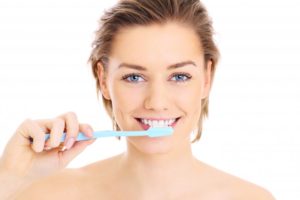 Regular cleanings and checkups with a dentist in Mount Holly are essential for removing plaque and tartar. However, there are things you can do at home to minimize the amount of material that builds up on your teeth. Not only will this make your teeth and gums healthier, it can also make your office visits more effective.
Regular cleanings and checkups with a dentist in Mount Holly are essential for removing plaque and tartar. However, there are things you can do at home to minimize the amount of material that builds up on your teeth. Not only will this make your teeth and gums healthier, it can also make your office visits more effective.
Home Care for Plaque and Tartar
Brushing at least twice a day is the single most important thing you can do to prevent plaque and tartar buildup. While most people know this, not everyone knows how to get the maximum benefits from brushing. Here are some handy tips:
- Place the brush at a 45 degree angle to your gums. This will help the bristles to cover the maximum amount of tooth surface.
- Move the toothbrush back and forth in gentle, short strokes. Brushing too vigorously can irritate your gums. Most people should use a soft bristle brush.
- Clean all surfaces of the teeth, including the backsides.
- Replace your toothbrush every 3 to 4 months or whenever the bristles become frayed, whichever comes first.
- Only use a toothbrush and toothpaste recommended by the ADA.
Some users report that electric toothbrushes help them to reach certain areas of their mouth easier while providing a more enjoyable brushing experience. Others prefer to stick with manual brushes. The type you choose is less important than how you use it and how often.
Flossing Tips
While brushing is vital, by itself it can never do an adequate job of dental self-care. That’s why flossing is so crucial. You should floss at least once a day to get the maximum benefit from the practice. You’ll find floss brands on the market in a variety of thicknesses. Some have waxed coatings, which many users prefer. You can even find flosses that have yummy sugar-free flavorings. These are a great way to get kids into the flossing habit.
If you prefer not to floss, you might want to try an interdental toothbrush instead. These products are designed with specially shaped heads that can reach areas in between teeth.
After flossing, it’s a good idea to follow up with a fluoridated dental rinse or mouthwash. Many of these products are available in alcohol-free formulas. Not only do they promote better oral health, they can help to control bad breath.
Brushing, flossing, and rinsing are all important practices. But enjoying the highest possible level of dental health means taking a few added steps like these:
- Limit consumption of sweet and starchy foods. This will help to control the spread of harmful bacteria in your mouth.
- Eat a balanced diet that includes plenty of lean protein, calcium, and green, leafy vegetables. Foods like nuts and legumes can be helpful as well. However, you should avoid cracking shells with your teeth, as this can chip away the protective enamel.
- Stay away from tobacco products of all kinds. Smokers are at far greater risk for developing oral health issues than non-smokers.
Use the tips in this post to keep your teeth and gums healthy in between dental visits. Your dentist will be pleased with the progress you make, and so will you.
About the Authors
The staff at Mount Holly Family Dentistry is committed to their patient’s dental health and overall well-being. They provide a wide range of services, including emergency care. You can reach the office online or by calling (609) 267-3230.
